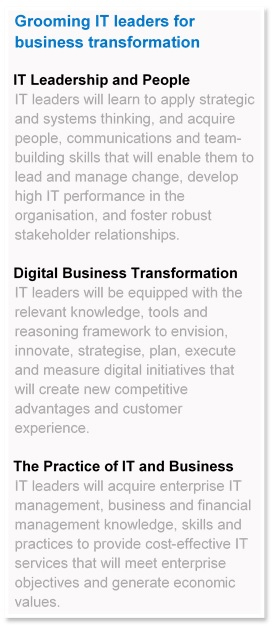Information and communication technology has changed every aspect of our lives, and will continue to affect businesses and society in unanticipated and unprecendented ways. Grooming the next generation of IT leaders who are able to harness these technologies, tackle the business challenges and manage the risks is the critical imperative for every organisation to succeed in the digital economy.
The digital revolution is underway, done in full view of everyone and yet still ignored by many. Digital technologies have intensified competition, disrupted business practices and models, and refined industries. Examples of industries that have been blindsided by technology are public transport (Uber, Grabtaxi), hospitality (Airbnb, HomeAway) and entertainment (Netflix, Amazon Prime). It is not a question of if, but when and how an industry will face digital disruption.
How can CIOs and IT leaders lead digital transformation, defend against the onslaught of digital disruption and deliver IT organisational effectiveness all at the same time?
Ms Lim Hooi Ling (photo on left), Chief of the newly launched Master of Technology in IT Leadership (MTech ITL) Programme in NUS-ISS, explains that digital technologies are key drivers of innovation, competition and differentiation for companies that can offer tremendous opportunities for value creation. It can lower cost barriers, create new competitive advantage and level the playing field as incumbents increasingly face competition from start-ups and companies from other industries and geographies. CIOs need to develop high-performing IT teams that help them deliver results and achieve business outcomes.
According to Mr Khoong Chan Meng (photo on right), Director & CEO of NUS-ISS, this wave of innovation will only intensify as each new generation of IT-savvy entrepreneurs enters the market with increasingly smart ideas. The trend is not limited to digital businesses and can affect every brick-and-mortar company. He cited paper production as an example.
There is plenty of cost and productivity potential locked in the paper production process, from controlling the temperature to the chemical dosing of pulp fibres. While a mistake in any of the steps can amplify and lead to huge economic impact, it also presents an opportunity for technologies like sensors, visualisation tools, wireless communication systems and data analytics to be applied as an integrated solution to optimise processes and lower operating costs.
"The role of IT leaders have changed. It has become increasingly complex as technology application has become ubiquitous and a critical factor in business success," said Chan Meng, "IT leaders no longer just run technology operations, they are now expected to play important roles in managing technology risks and charting sustainable business growth."
Whether it is to defend against external competition or improve internal effectiveness, the IT team will be required to master several critical skills, including foresight, business acumen and cultural intelligence, and a broad spectrum of management knowledge to frame the issues correctly and lead the project effectively.
Yet, many businesses have systems managers when they need technology leaders who are capable of driving technology innovation and actively contributing to business success. This requires an integrated programme that develops deep leadership capabilities and functional skills and embraces a practice-based approach that will equip IT leaders with the relevant and diverse skill-sets needed to lead IT projects successfully from concept to result.

"The new NUS Master of Technology in IT Leadership is, in fact, developed with that specific objective in mind," said Hooi Ling. Foremost IT and business leaders from Singapore's public and private sectors, community of IT leaders (IT Management Association) and IT professionals (Singapore Computer Society) were consulted to ensure that the curriculum for Singapore's first master's degree programme on IT leadership addresses core competencies and will produce future-ready IT leaders.
The master's programme intends to raise the students' self-awareness, equip them with the leadership skills and mind-set to be agile and navigate in a VUCA (volatile, uncertain, complex and ambiguous) environment; drive digital transformation, change and collaboration; be operationally sound and delivery results; develop people; and run a high-performing IT organisation.
Students in the programme will engage in case-based workshops, discussions, dialogues and sharing by experienced faculty and instructors, practising CIOs, business leaders, entrepreneurs from NUS-ISS, School of Computing, Information Technology Management Association and the industry. The courses are grouped in the three key study areas of "Digital Business Transformation", "The Practice of IT and Business" and "IT Leadership and People". Students will practise new knowledge and skills learnt in a capstone project in a real-life organisation.
Chan Meng believes that the value of the master's programme will lie beyond knowledge transfer, "When IT leaders learn to consider organisational issues at a strategic level alongside business leaders, they will achieve confidence in their own leadership, capabilities and insights that will ultimately assure them of personal and organisational success."
Lead digital transformation. Nurture a team of effective IT leaders who are strategic, forward-thinking and motivated to help the organisation succeed in the increasingly technology-reliant business environment start by learning about the NUS Master of Technology in IT Leadership programme.